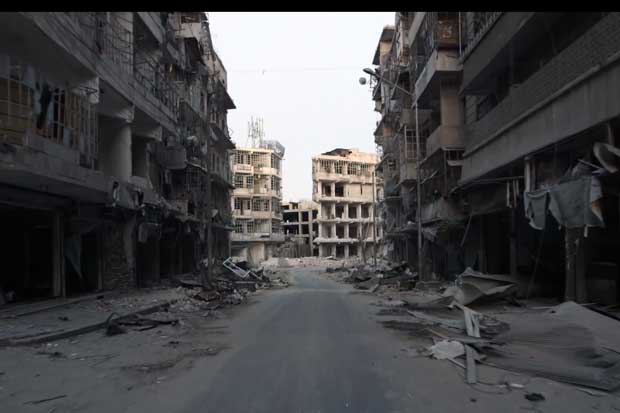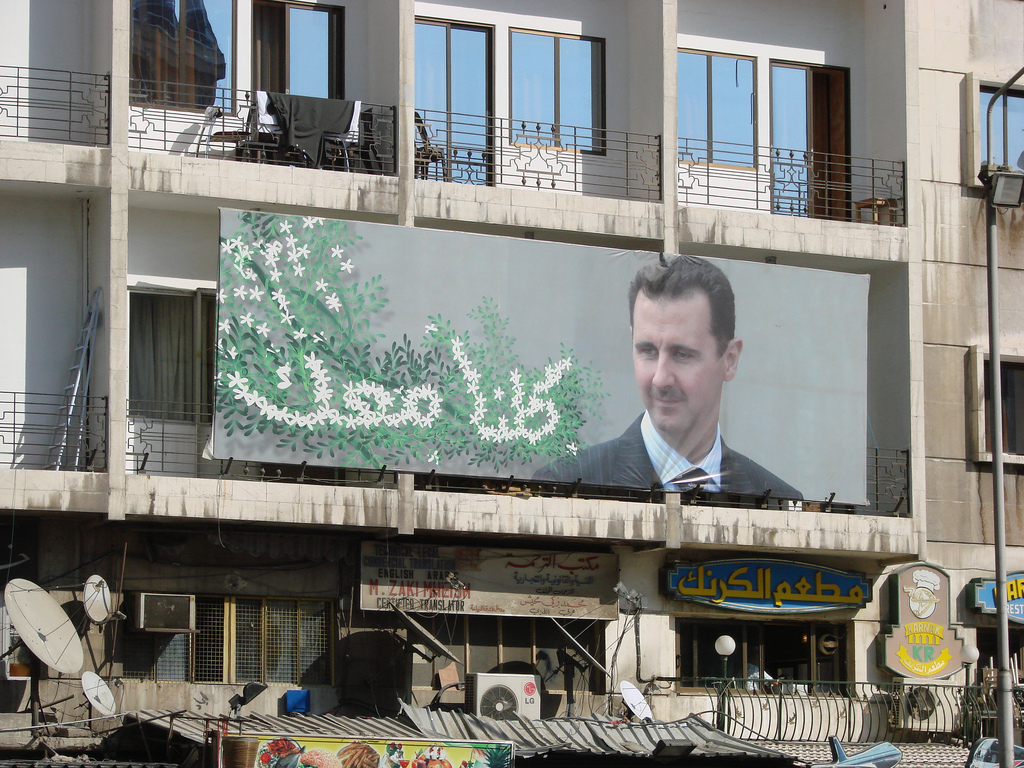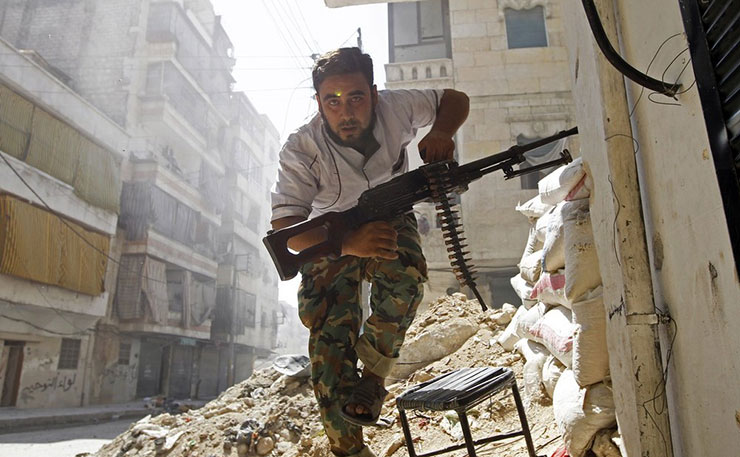Recently, independent Member of Parliament Andrew Wilkie declared that Australia bombing Syria would be illegal under international law.
In a statement on 9 September, he wrote: “The fact is that this will clearly be a breach of international law. These airstrikes are not at the invitation of the Syrian government and there is no United Nations imprimatur. Moreover the UN provision for collective self-defence doesn’t apply in this case because we are acting at the behest of the United States which faces no threat from Syria.”
In a few short paragraphs, Wilkie succinctly attacked the war, Western foreign policy and how we laid the groundwork for the rise of Daesh:
“These airstrikes also just won’t work. You can’t defeat an unconventional enemy like Islamic State by dropping bombs. And regardless, Australia’s contribution will be so small as to be operationally insignificant.
“By bombing Syria all the Government will be doing is supporting the Assad regime and dragging Australia even further into the broader civil war in the Middle East.
“The madness of this situation is beyond belief. First we invaded Iraq 12-years-ago which destroyed that country and fundamentally destabilised the region. Then we supported the Syrian rebels because they were fighting President Assad who is Washington’s enemy. Problem is, the rebels included Islamic State so now we are going to bomb them even though doing so supports Assad.
“In other words we helped create this mess and have done everything to make it worse. But now we think that more of the same will fix it. About the only thing we know for sure is we shouldn’t have started the war in the first place, and shouldn’t have supported the Syrian rebels in the second place.”
These were perhaps the most intelligent comments made yet by a politician on our new war. Yet Tony Abbott’s policy acquired a perhaps unlikely defender: the ABC.
ABC Fact Check decided to “fact check” Wilkie’s claim that the war would be illegal. As will be clear, their analysis is absurd, and clearly goes well beyond their limited competence. Besides a video supposedly showing that Wilkie’s claim is “doubtful – that’s a fact check”, there’s also a text version of their commentary.
Fact Check’s analysis depends on the views of four scholars on international law, Ashley Deeks, from the University of Virginia law, Ben Saul and Alison Pert, from the University of Sydney, and Kevin Boreham from the Australian National University.

Firstly, it should be noted that Fact Check’s own quoted statements from these favoured experts undercut their conclusion.
Boreham’s conclusion: “Mr Boreham said this was a grey area of international law and it was not possible to say Australia’s air strikes in Syria would be completely illegal.” Not completely illegal is not exactly a ringing endorsement of the lawfulness of bombing Syria.
Next: “Professor Saul said Mr Wilkie’s claim that Australia bombing Syria was illegal was ‘probably correct’.” And “Dr Pert said there were strong arguments to say the bombing was illegal.” Only Professor Deeks, the American law professor, was actually willing to endorse the legality of the war on Syria. So it appears from Fact Check’s own experts that it is not Wilkie’s claims, but the legality of the war – and their own competence as fact-checkers – that is doubtful.
Let’s examine the arguments made a little more closely. Article 51 of the United Nations Charter allows for the use of force in self-defence:
Nothing in the present Charter shall impair the inherent right of individual or collective self-defence if an armed attack occurs against a Member of the United Nations, until the Security Council has taken measures necessary to maintain international peace and security. Measures taken by Members in the exercise of this right of self-defence shall be immediately reported to the Security Council and shall not in any way affect the authority and responsibility of the Security Council under the present Charter to take at any time such action as it deems necessary in order to maintain or restore international peace and security.
As is clear, self-defence is allowed in a brief window, until the Security Council has taken relevant measures to act. Article 51 was plainly drafted in a narrow way to limit when force can be used.
Professor Deeks claims that since September 11 2001, interpretations of international law have changed, to allow the use of force under Article 51, not just against states, but also against non-state actors. Fact Check reports: “Professor Deeks noted the UN Security Council passed a resolution recognising that 9/11 was an ‘armed attack’ from a terrorist organisation and that the US had the right of self-defence. ‘I think that frankly puts the question to bed really,’ she said.”
Included in that statement is a link to UN Security Council Resolution, passed on 12 September. It doesn’t use the phrase “armed attack”.
It “condemns” them, and “regards such acts, like any act of international terrorism, as a threat to international peace and security”. But it doesn’t say anything about endorsing any wars. It includes within it: “Determined to combat by all means threats to international peace and security caused by terrorist acts, recognizing the inherent right of individual or collective self-defence in accordance with the Charter”. Which suggests that the United States, too, has to act in accordance with the UN Charter.
The Security Council did retrospectively endorse the invasion of Afghanistan in Resolution 1378, but Precisely why Professor Deeks thinks this has ‘put anything to bed’ – including her arguments – is unclear. The ABC simply didn’t bother to fact check that claim.
Fact Check then introduces the arguments of Boreham. He says that attacking non-state groups like Daesh is “a reasonable case under international law, but its not indisputable.”
Fact Check observes:
The legality of attacking a non-state was considered in 2004 when the International Court of Justice ruled that states only had a right to self-defence against armed attacks originating from a sovereign state.
The court advisory opinion stated that Israel could not claim that building a wall in the occupied Palestine territories was an act of self-defence under Article 51 because Palestine wasn’t a state, though some ICJ judges disagreed.
Specifically, paragraph 139 of the judgment holds that “Article 51 of the Charter thus recognizes the existence of an inherent right of self-defence in the case of armed attack by one State against another State.” Thus, “Article 51 of the Charter has no relevance in this case”.
There is no more authoritative interpreter of international law than the International Court of Justice (ICJ). 15 judges ruled on the issue. In addition to the main judgment, there were six separate opinions and one Declaration. The two dissenters on the issue of whether self-defence under Article 51 applies in relation to non-state actors were the British judge and the American one.
Boreham further explains his views in an op ed at the Conversation. He writes with some ambivalence that:
“Australia could claim that it is exercising the right of collective self-defence, in response to IS attacks in Iraq, along with the US and other nations. But the International Court of Justice has said in several cases – most controversially in its 2004 advisory opinion on the legality of the wall between Israel and Palestine – that the Charter right of self-defence only applies to an armed attack by another country, not a non-state actor.”
Why an almost unanimous judgment is “controversial” is not explained.
Boreham hedges his bets a little by writing: “Several judges of the court have disagreed. UN Security Council resolutions 1368 and 1373, adopted after September 11, recognised a right to self-defence against terrorist attacks.” Yet why dissident judges would outweigh the majority view is left unexplained. And note that Boreham invoked a higher legal authority than any suggested by Fact Check – a judgment from years after 9/11 and the war on Afghanistan, which supposedly changed international law so much.
Boreham goes on to claim that, “Australia could therefore argue that the right of self-defence should apply against the territory of a country that assists or harbours the terrorist group.” However, they would need to provide the “necessary evidence to show that the Assad régime is assisting or harbouring IS”.
Apparently determined to create his own legal justification for the war, Boreham argues that Australia should claim that Islamic State is an actual state. Under this theory, “IS, as a ‘state’, has attacked Iraq, which has appealed to Australia and other states to fight IS under the UN Charter right to collective self-defence. Australian air attacks against IS targets in Syria would not be definitely legal but not definitely illegal.”
Putting aside whether Islamic State actually is a state (we haven’t recognised it), under Boreham’s analysis, which is prima facie questionable, the legality of the war on Daesh seems an open question.

Let us turn to the analysis of Saul. He qualifies his view that the war is probably illegal: “The smart money would be on an argument that it’s illegal but there’s a reasonable chance that if this went to the ICJ again, this time around, they might change their minds”. Note: changing their minds shows what the law currently is, as determined by the most authoritative interpreters of international law.
He expanded on his views in an op-ed in Fairfax, reiterating that the ICJ’s position is inconsistent with the war-mongering US:
An obstacle is that even after 9/11, the International Court of Justice insisted in a number of cases that self-defence still only exists to counter attacks by another country. A number of judges demurred, arguing the court should take into account 9/11. Some noted the UN Charter itself does not limit self-defence to government attacks, but that the court itself introduced that limitation. Those judges were, however, few.
Saul explained that international law does change to “express the world’s collective preferences… The law may be close to a tipping point, but there is no consensus the law has changed. The short span of sporadic post-9/11 developments is too uncertain to overturn 70 years of stable law.” He pointedly commented that “International law is not just what the US or Australia says it is.”
Which is to say that one of Fact Check’s experts has explicitly explained that the law might change, but currently does not support the war on Daesh. Why didn’t Fact Check fact check Saul’s op ed too?
Finally, there’s Dr Pert. Her views are rendered as follows:
“Dr Pert said there were strong arguments to say the bombing was illegal. But she said international law was moving towards states defending against attack from non-states, such that strikes against Syria might be legal. ‘In other words, we are starting to see the building blocks of a change in customary international law,’ she said. ‘Quite where we are on that spectrum is subject to debate, which is why everyone has slightly different views.'”
So the issue is “subject to debate”, but there are “strong arguments to say the bombing was illegal”. Which is to say, perhaps this area of international law is not extremely clear, but two out of four international law scholars lean towards the war on Syria being illegal, one hedges his bets and thinks it may not be “completely” legal or illegal, and one American scholar supports the war. These are Fact Check’s chosen experts, and it still concludes from this that Wilkie’s claim is “doubtful”.
Considering that Fact Check’s chosen experts don’t agree with each other, and two or three of them expressed sympathy with his position, on what basis does it decide that the position of an American legal academic outweighs that of a strong majority of the International Court of Justice? On what basis does it decide, even within the terms of its own article, that Wilkie’s claim is doubtful?
This is no trivial matter. Ben Saul explains that our war is illegal under international law – but might one day be legal if international law changes in the ways that Western states would like it to change. His view seems to me the most persuasive.
Yet ABC’s Fact Check has tendentiously selected from the comments of international law scholars, falsely finding a consensus that didn’t exist, falsely helping legitimise a war for which the government still has made no serious case.
Donate To New Matilda
New Matilda is a small, independent media outlet. We survive through reader contributions, and never losing a lawsuit. If you got something from this article, giving something back helps us to continue speaking truth to power. Every little bit counts.




